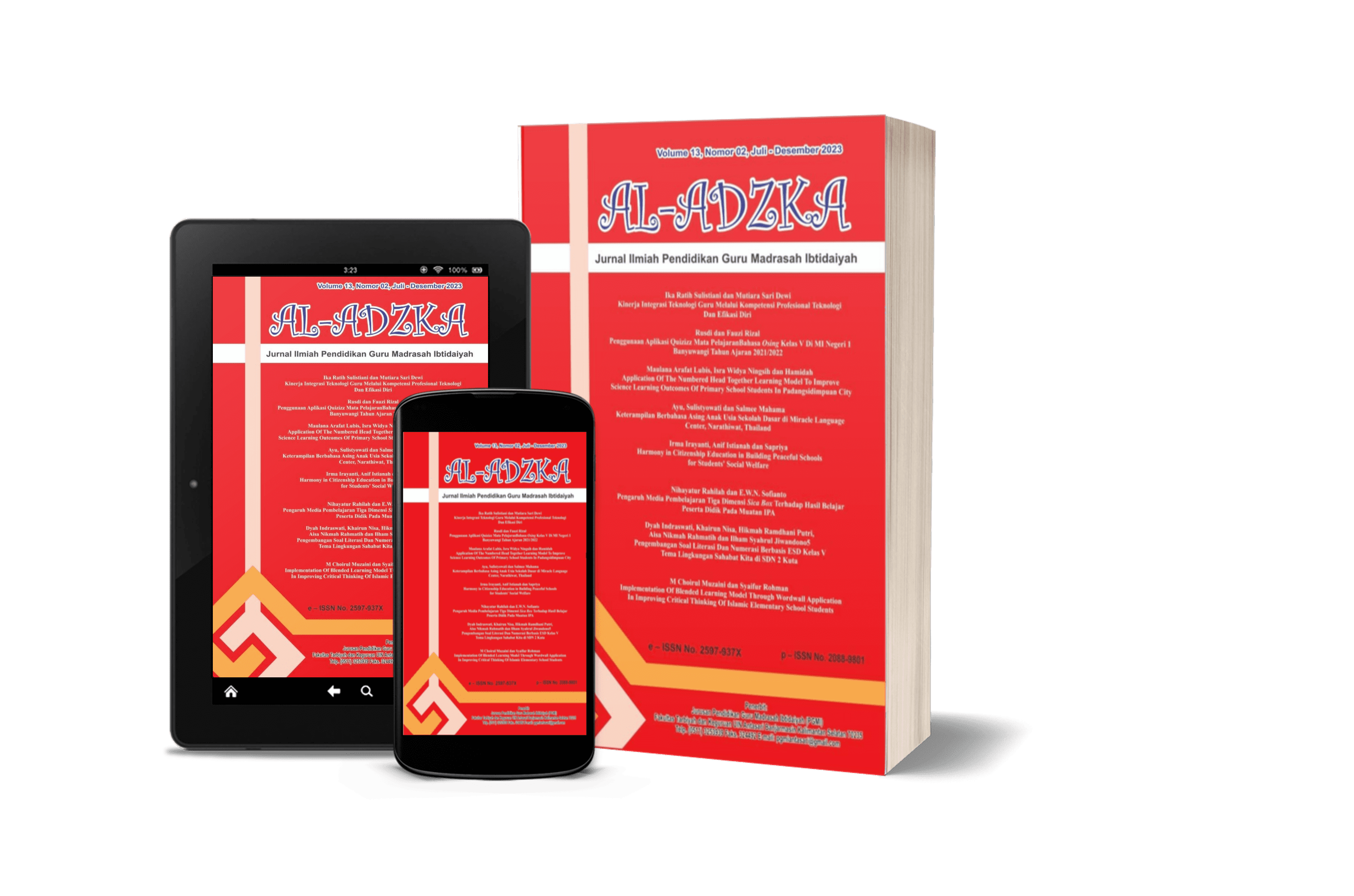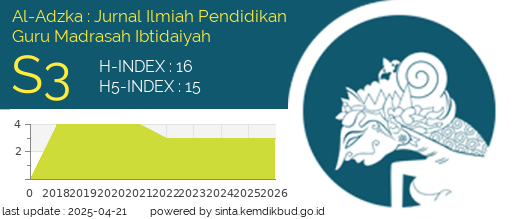The Infusion of Science into Sustainable Lifestyles Project: A Case Study of Implementing a Merdeka Curriculum at Six Sekolah Penggerak in West Java
DOI:
https://doi.org/10.18592/aladzkapgmi.v13i1.9347Keywords:
science, merdeka curriculum, sekolah penggerak, project profil pelajar PancasilaAbstract
The Infusion of Science into Sustainable Lifestyles Project was a case study conducted in six elementary schools in West Java, Indonesia to examine the implementation of a Merdeka Curriculum. A project aimed at increasing students' awareness of the principles of Pancasila, a set of national values, and promoting sustainable lifestyles. The study used a case study research method, including observations, interviews, and document analysis, to understand the development and implementation of the project. The results showed that the project included a variety of activities, such as games, simulations, and discussions, to engage students and help them understand the principles of sustainable living. The study also found that integrating science content, such as information about ecosystems and the environment, was an effective way to enhance the sustainability theme of the project. The researchers concluded that the Infusion of Science into Sustainable Lifestyles Project was successful in promoting sustainable lifestyles among students and recommended continued implementation and evaluation of the project in the future.References
Akiri, E., & Dori, Y. J. (2022). Professional Growth of Novice and Experienced STEM Teachers. Journal of Science Education and Technology, 31(1), 129–142. https://doi.org/10.1007/s10956-021-09936-x
Annur, A. F., & Sari, R. (2022). Al-Adzka : Jurnal Ilmiah Pendidikan Guru MI Implementation of Environmental Education in Improving The Environmental Ethics of Madrasah Ibtidaiyah Students To Support SDGs 2030. 12(2), 99–108. https://doi.org/10.18952/aladzkapgmi.v12i2.7490
Arifin, M. B. U. B., Sholeh, M., Hafiz, A., Agustin, R. D., & Wardana, M. D. K. (2021). Developing Interactive Mobile Mathematics Inquiry to Enhance Students’ Problem-solving Skill. International Journal of Interactive Mobile Technologies (IJIM), 15(01 SE-Papers), 24–38. https://doi.org/10.3991/ijim.v15i01.20067
Ayu, D. G., Triwoelandari, R., & Fahri, M. (2019). Media Pembelajaran Powtoon Terintegrasi Nilai-Nilai Agama pada Pembelajaran IPA untuk Mengembangkan Karakter. Al-Adzka: Jurnal Ilmiah Pendidikan Guru Madrasah Ibtidaiyah, 9(2), 65. https://doi.org/10.18592/aladzkapgmi.v9i2.3088
Carrapatoso, A. (2021). Education for Sustainable Development and Action-Oriented Learning at Higher Education Institutions: Reflections on a Trans-Disciplinary Teaching Project. Journal of Political Science Education, 17(S1), 12–22. https://doi.org/10.1080/15512169.2021.1914067
Cigdemoglu, C., & Köseoğlu, F. (2019). Improving Science Teachers’ Views about Scientific Inquiry: Reflections from a Professional Development Program Aiming to Advance Science Centre-School Curricula Integration. In Science and Education (Vol. 28, Issues 3–5). https://doi.org/10.1007/s11191-019-00054-0
Domenici, V. (2022). STEAM Project-Based Learning Activities at the Science Museum as an Effective Training for Future Chemistry Teachers. Education Sciences, 12(1). https://doi.org/10.3390/educsci12010030
Haatainen, O., & Aksela, M. (2021). Project-based learning in integrated science education: Active teachers’ perceptions and practices. Lumat, 9(1), 149–173. https://doi.org/10.31129/LUMAT.9.1.1392
Hamidah, J. (2022). Pelatihan Penyusunan Projek Penguatan Profil Pelajar Pancasila Pada Kepala Sekolah Dan Guru-Guru Sekolah Dasar Di Kabupaten Banjar-Kalimantan Selatan. JURNAL CEMERLANG : Pengabdian Pada Masyarakat, Vol 4 No 2 (2022): JURNAL CEMERLANG: Pengabdian Pada Masyarakat, 259–271.
Hartoyo, D. R. dan A. (2022). Potret Kurikulum Merdeka, Wujud Merdeka Belajar di Sekolah Dasar. Jurnal Basicedu, 5(4), 2247–2255.
Hofverberg, H., & Westerlund, S. (2021). Among Facilitators, Instructors, Advisors and Educators – How Teachers Educate for Sustainability in Design and Craft Education. International Journal of Art and Design Education, 40(3), 543–557. https://doi.org/10.1111/jade.12366
Irawati, D., Iqbal, A. M., Hasanah, A., & Arifin, B. S. (2022). Profil Pelajar Pancasila Sebagai Upaya Mewujudkan Karakter Bangsa. Edumaspul: Jurnal Pendidikan, 6(1), 1224–1238. https://doi.org/10.33487/edumaspul.v6i1.3622
Korsager, M., & Scheie, E. (2019). Students and education for sustainable development – what matters? A case study on students’ sustainability consciousness derived from participating in an ESD project. Acta Didactica Norge, 13(2), 1–26. https://doi.org/10.5617/adno.6451
Lubaba, M. N., & Alfiansyah, I. (2022). Analisis Penerapan Profil Pelajar Pancasila Dalam Pembentukan Karakter Peserta Didik Di Sekolah Dasar. Sains Dan Teknologi, 9(3), 2022–2687.
Martín-Sánchez, A., González-Gómez, D., & Jeong, J. S. (2022). Service Learning as an Education for Sustainable Development (ESD) Teaching Strategy: Design, Implementation, and Evaluation in a STEM University Course. Sustainability (Switzerland), 14(12). https://doi.org/10.3390/su14126965
Miller, E. C., Reigh, E., Berland, L., & Krajcik, J. (2021). Supporting Equity in Virtual Science Instruction Through Project-Based Learning: Opportunities and Challenges in the Era of COVID-19. Journal of Science Teacher Education, 32(6), 642–663. https://doi.org/10.1080/1046560X.2021.1873549
Nguyen, T. P. (2018). Education for Sustainable Development in Vietnam: exploring the geography teachers’ perspectives. International Research in Geographical and Environmental Education, 27(4), 341–356. https://doi.org/10.1080/10382046.2017.1366204
Nurasiah, I., Marini, A., Nafiah, M., & Rachmawati, N. (2022). Nilai Kearifan Lokal: Projek Paradigma Baru Program Sekolah Penggerak untuk Mewujudkan Profil Pelajar Pancasila. Jurnal Basicedu, 6(3), 3639–3648. https://doi.org/10.31004/basicedu.v6i3.2727
Nurhayati, N., Erni, S., & Suriani, S. (2016). Sustainable Life Style Masyarakat Perkotaan (Studi Tentang Gaya Hidup Berkelanjutan Masyarakat Perkotaan di Riau). Sorot, 11(2), 75. https://doi.org/10.31258/sorot.11.2.3885
Nurtrianik. (2022). Projek Penguatan Profil Pelajar Pancasila; Butuh Pemahaman dan Interpretasi Guru. Warta Pendidikan | E-Journal, Vol. 7 No. 3 (2022): Warta Pendidikan, 38–40.
Pranjol, M. Z. I., Oprandi, P., & Watson, S. (2022). Project-based learning in biomedical sciences: using the collaborative creation of revision resources to consolidate knowledge, promote cohort identity and develop transferable skills. Journal of Biological Education, 00(00), 1–17. https://doi.org/10.1080/00219266.2022.2147576
Rahmawati, Y., Taylor, E., Taylor, P. C., Ridwan, A., & Mardiah, A. (2022). Students’ Engagement in Education as Sustainability: Implementing an Ethical Dilemma-STEAM Teaching Model in Chemistry Learning. Sustainability (Switzerland), 14(6). https://doi.org/10.3390/su14063554
Rizal, Y., Deovany, M., & Andini, A. S. (2022). Kepercayaan Diri Siswa Pada Pelaksanaan Projek Penguatan Profil Pelajar Pancasila. Sosial Horizon: Jurnal Pendidikan Sosial, 9(1), 46–57. https://doi.org/10.31571/sosial.v9i1.3699
Sholeh, M., Jannah, R., Mahmudah, & Khairunnisa. (2021). Pengembangan Model Pembelajaran Efektif dan Bermakna di MI Perwanida Blitar. Muallimuna : Jurnal Madrasah Ibtidaiyah, 3(2), 116–127. https://doi.org/http://dx.doi.org/10.31602/muallimuna.v6i2.4301
Songer, N. B., & Linn, M. C. (1991). How do students’ views of science influence knowledge integration? Journal of Research in Science Teaching, 28(9), 761–784. https://doi.org/10.1002/tea.3660280905
UNESCO. (2017). Education for Sustainable Development Goals Learning Objectives (Note: Imp lementierung der BNE). In Unesco: Vol. Education.
Yaacob, A., Mohd Asraf, R., Hussain, R. M. R., & Ismail, S. N. (2020). Empowering Learners’ Reflective Thinking through Collaborative Reflective Learning. International Journal of Instruction, 14(1), 709–726. https://doi.org/10.29333/IJI.2021.14143A
Published
How to Cite
Issue
Section
License
Copyright (c) 2023 Pipih Nurhayati, Diana Rochintaniawati, Yusi Riksa Yustiana

This work is licensed under a Creative Commons Attribution 4.0 International License.
Authors who publish with this journal agree to the following terms:
- Authors retain copyright and grant the journal right of first publication with the work simultaneously licensed under a Creative Commons Attribution 4.0 International that allows others to share the work with an acknowledgement of the work's authorship and initial publication in this journal.
- Authors are able to enter into separate, additional contractual arrangements for the non-exclusive distribution of the journal's published version of the work (e.g., post it to an institutional repository or publish it in a book), with an acknowledgement of its initial publication in this journal.
- Authors are permitted and encouraged to post their work online (e.g., in institutional repositories or on their website) prior to and during the submission process, as it can lead to productive exchanges, as well as earlier and greater citation of published work.












